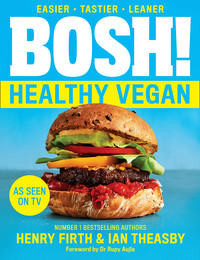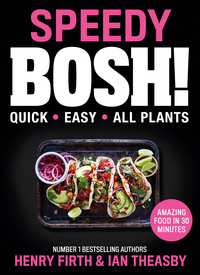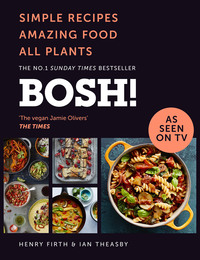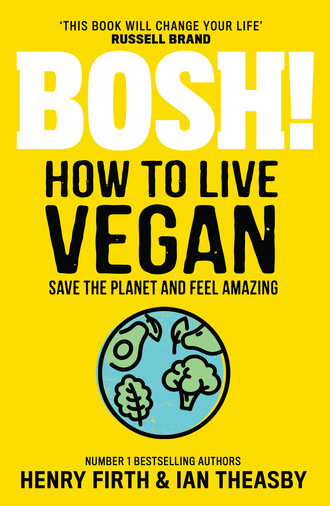
Полная версия
BOSH! How to Live Vegan
We are young professionals who travel on a regular basis around the UK and also around the world. We buy and eat food when we’re out and about. We enjoy our laptops, our phones – in fact, our whole living stems from being online 24/7. We buy clothes that are in fashion and we don’t refuse napkins or take our lunch in a metal box every day.
We have to own up and accept some responsibility for our choices.
Human civilisation has been around for about 12,000 years. The addition of excess carbon dioxide and other greenhouse gases into the planet’s atmosphere has all happened in our lifetime, in the last 30 years.[21], [22] And science shows us we have about the same amount of time left to fix it.[23]
It’s like some kind of sci-fi film plot that the entire history of humanity as we know it lies in the hands of just two generations. And at this point in the story, it doesn’t look much like a happy ending.
How terrifying is that?! But also, how amazing that it is potentially still possible to fix it.
There is, in fact, a lot to be positive about. As we all become more aware of what needs to be done, it’s incredibly encouraging to see people all around the world taking action and making great strides in the name of climate change and the environment.
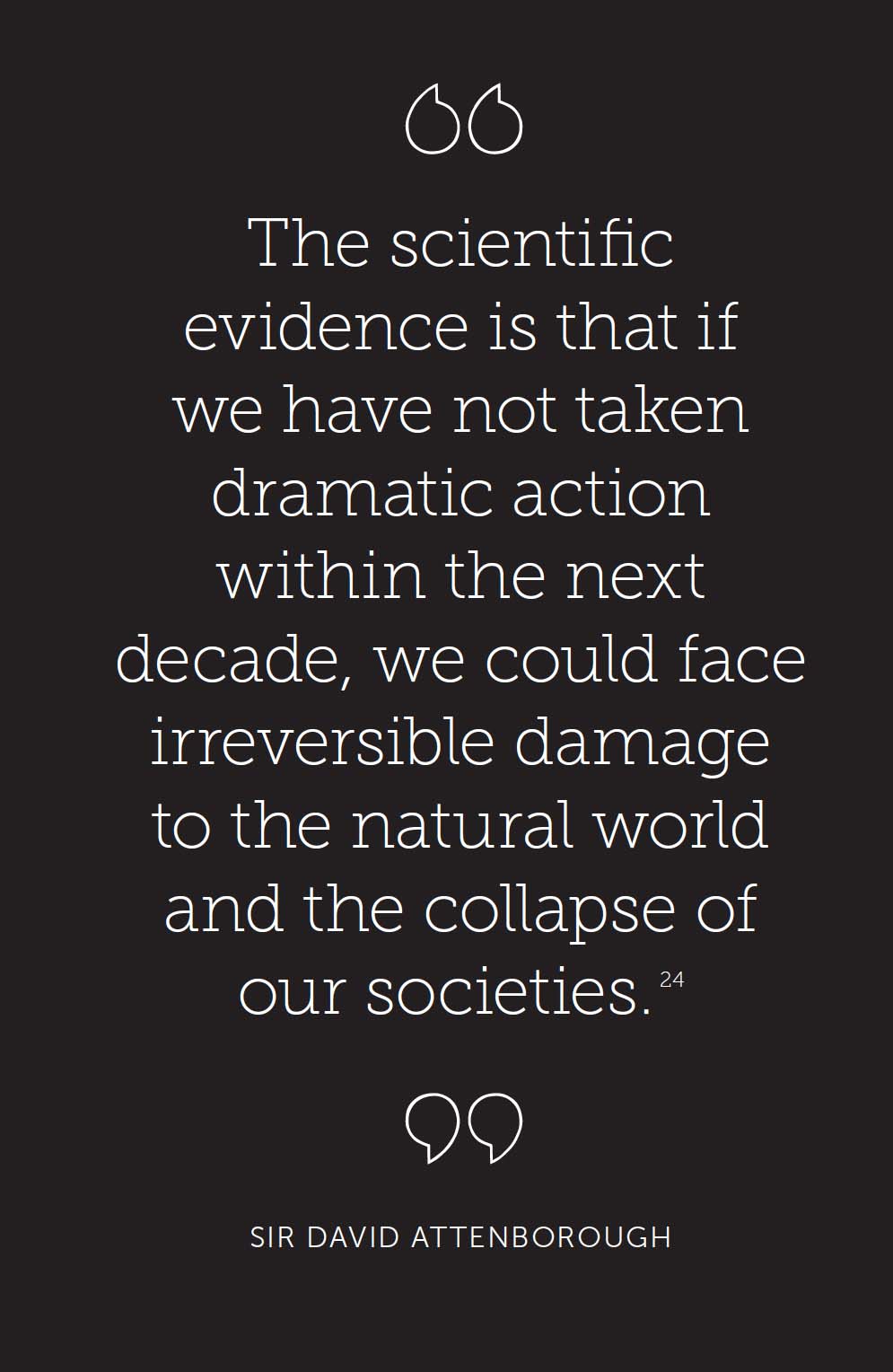
ANIMAL WELFARE
Climate change isn’t the only reason people come to veganism. There are three main motivations that lead people towards wanting to adopt a more plant-based way of eating and living:
1 The environment
2 The treatment of animals
3 Health
Whatever the reason you started out on your vegan journey, it’s inevitable that the more you read around the subject, the more you will start to care about the other two reasons as well.
Ian started eating vegan as part of a health kick one January, but then it quickly became more about animal welfare and the environment too. Henry came at it with climate change as his main motivation, but then found a renewed love of animals, and enjoyed better health to boot.
If you are fully engaged in your vegan journey – which we encourage you to be at all times – it’s impossible not to start caring about the cruelty inflicted on animals as part of current farming practices around the world. From animals packed into small living spaces or separating mothers from their children in the dairy industry, to the catastrophic destruction of wild fish populations from commercial fishing.
We’re often asked what’s so wrong about organic, free-range, high-welfare meat sourced from herds that roam freely across acres of beautiful fields and whose farmer talks to them every day and knows them all by name. Surely that’s OK, right?
Well, aside from the debate over whether it’s ever OK to kill another creature, the main issue we have here is that it’s simply not sustainable for everyone on the planet to eat in this way. Most people don’t eat, don’t have access to or simply can’t afford to eat meat that has been raised in this way. And we simply don’t have the space on the planet to do it either. Many animal products on supermarket shelves come from animals that have been raised in poor conditions in factory farms, farmed cheaply to meet with demand. [25], [26]
We want to move towards food and lifestyle choices that work for everyone, not a select few.
HEALTH
The majority of people choosing to eat more plants are actually doing so for health reasons.[27] Although animal welfare is a very close second.
We know, first hand, how amazing eating a vegan diet can make you feel. Almost instantly we both felt lighter – we lost weight, sure, but we also felt lighter in ourselves too. We slept better, our digestion was better, our hair was thicker – and a surprising benefit was that our hangovers were easier too! Result! (Although it did take us a while to find the perfect vegan alternative to a hangover bacon sandwich … To be honest, that was one of the main motivations behind our Big Breakfast Bagel in our second book, BISH BASH BOSH!) We also found our energy levels were easier to sustain, rather than having an afternoon dip, or evening slump in front of the TV.
That’s not to say all vegan food is healthy – you can easily be unhealthy on a vegan diet, as you can on any diet. But generally, if you’re eating more veg, then you’re going to quickly see improvements in how you look and feel.
As a happy knock-on effect too, we found we became more conscious of everything we were putting into our bodies. Reading the backs of labels to see if they were vegan or not (more on this later) meant we also became more aware of other ingredients we might want to avoid – the additives and preservatives and colourings that we all know aren’t doing us any good. Of course, we sometimes choose things that we know aren’t very healthy – it’s all about balance after all, and we both have a MASSIVE sweet tooth! – but we’re now a bit more aware of our choices.
But don’t just take our word for it, there’s plenty of science to back it up too.
A diet rich in fruit and veg is higher in vitamins, nutrients and fibre. And since it’s much harder to overeat if you’re mainly eating veg, it’s harder to gain a lot of excess weight. In fact, a growing body of doctors, dieticians and athletes now say that a plant-based diet is the best way to fuel and protect our bodies. There is increasing evidence that eating a well-planned plant-based diet is linked with lower body weight,[28] lower rates of obesity,[29] diabetes[30] and heart disease.[31] For more on why you’ll feel AMAZING on a plant-based diet, see here.
SO WHAT CAN WE DO ABOUT IT?
Climate change is a complicated problem (err … understatement!) with lots of different perspectives to consider. There are so many contributing factors to climate change that there’s no one clear way out of the mess. When you’re faced with such a multitude of facts and figures, arguments and opinions, we know how easy it can be to feel analysis paralysis! We’re so overwhelmed by the complexity of the problem, we never decide how best to tackle it. Perhaps that’s why historically, as a global community, we’ve not done an awful lot about it so far.
Leading bodies say we need to embark on a World War 2 level effort to combat climate change,[32] and yet it’s definitely a more abstract problem to get to grips with – harder to picture, harder to explain, harder to solve. This can leave us frozen in indecision, right down to the smallest of everyday choices. There are so many people with different answers to the problem that it’s hard to know what to believe. We’re blocked by confusion and doubt.
Are plastic straws to blame? Should we all buy electric cars? Stop taking flights and start going on holiday by train? Where does food waste fit into the problem? Do we have to go veggie? But surely eating local meat and eggs is better than eating avocados and quinoa from South America?
On a personal level, the main barrier we think we all face is a feeling of helplessness.
What can we really achieve, as individuals? How can we change what’s being done by billions of people, if even governments and big businesses are not able to stop it? While some people are unwilling to make changes to help the greater good, surely the vast majority of humanity would want to help, if only they knew how?
Ian went through a phase of using bamboo toothbrushes and tried to live as close to zero waste as he could. But in our job – developing recipes every day – it’s almost impossible to live like this. We made a decision that we could have more impact if we concentrated on our main message of making delicious plant-based food available to everyone. We use sustainable ingredients as much as we can, but we can’t do everything all at the same time. And that’s OK – we do what we can.
We held our love for steak and roast dinners on a proverbial weighing scale and compared it with our love for the world and the future we wanted for the next generation. We loved food, had our favourite meals, and didn’t want to give them up. Henry’s obsession with fish and chips, swimming in tartare sauce, held him back for a while. But as we looked deeper into the facts, we were unable to resist the reality of the situation.
THE MAIN CAUSES OF CLIMATE CHANGE
There are two main causes of climate change which far outweigh any others: animal agriculture and transport.
Let’s start with transport. A return flight from London to New York costs the Arctic three square metres of ice per person.[33] One thing we can all do to reduce our carbon footprint is to consider flying less and avoiding air-freighted goods. Following the rule of supply and demand, if we fly less, fewer flights will take place and air travel will cause fewer carbon dioxide emissions in the future. The same goes for choosing to drive electric cars instead of standard diesel or petrol vehicles.
Animal agriculture, however, has much further reaching consequences. Cutting down your transport emissions reduces your greenhouse gas output. This is a simple equation.
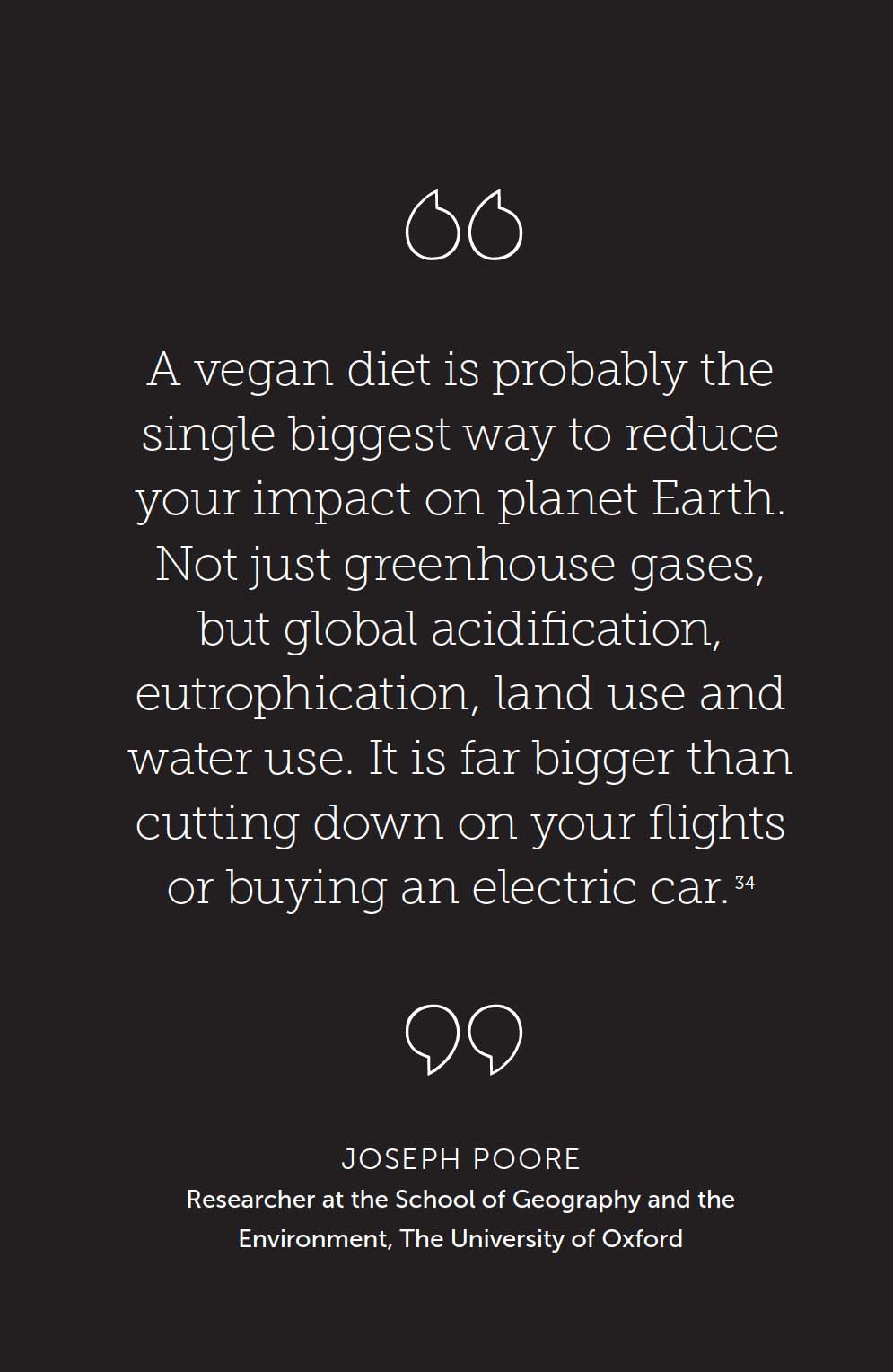
Using the same rule of supply and demand, cutting down on animal products reduces carbon dioxide and methane emissions, land and water use, rainforest deforestation and destruction of wildlife.
If going vegan seems a stretch too far, then even just eating one more plant-based meal per week is a powerful action. If everyone in the UK dropped meat from one meal a week, we could slash emissions by more than 8%, equivalent to taking 16 million cars off the road. It would also mean a 23% reduction in the UK’s domestic and international farmland use and a 2% reduction in our water use.[35] And in the US, if everyone replaced chicken with plant-based foods in one meal per week, the carbon dioxide savings would be equivalent to taking half a million cars off the roads. [36]
The international committee for climate change has said that in order for the UK to reach their emissions targets of a net zero emissions economy by 2050, households will need to undergo at least a 20% reduction in their beef, lamb and dairy consumption.
Source: Climate Change – The Facts
So the science really is that clear. The single biggest thing we can all do as individuals, much bigger than changing our approach to transport, is to eat more vegan, more plant-based meals. Given the wealth of experts across all fields of research telling us to eat fewer animal products, it’s time to act. We now know we can fight climate change with diet change. We are now aware of the consequences of our actions. Past this point, we’re to blame if we don’t take action.
Will we rise to the challenge and save the world we live in, for ourselves and future generations? Our preferences for meat and dairy have led us to destroy the planet, turning forest and grasslands into grazing lands because we love the taste of hamburgers. Come on, guys! That’s madness!
We make enough food to feed everyone on the planet, and yet nearly a billion people starve. We feed the food that they could eat to cattle, so that we can eat steak. Eighty-two per cent of the world’s starving children live in countries where food is fed to animals, which are then killed for meat and exported; eaten by wealthier individuals in developed countries like the US, UK and mainland Europe.[37]
It’s time we stepped up to the (vegan) plate and took some positive action.

Animal farming uses up 83% of global agricultural land, but provides just 18% of global calories.[38]
These were the facts that we faced four years ago, that led us, as extremely devoted lifelong meat eaters, to make the decision we made. We loved the taste of meat and dairy, but that didn’t sit right with us. We wanted to make a change. So we went vegan.
That’s all the bad news out of the way. Now for the good news.
Making the decision to cut animal products out of our diet was the best decision we ever made. It’s not restrictive. We eat a wonderful variety of foods and have all the flavours and choices we want.
Since becoming vegan we’ve both become infinitely more open-minded about our food choices. Closing the door on meat, dairy and fish has enabled us to open up a thousand other exciting plant-based doors. Our attitude to food now is far more broad-minded than ever before and, as a direct result, our diet is more diverse than we would ever have imagined.
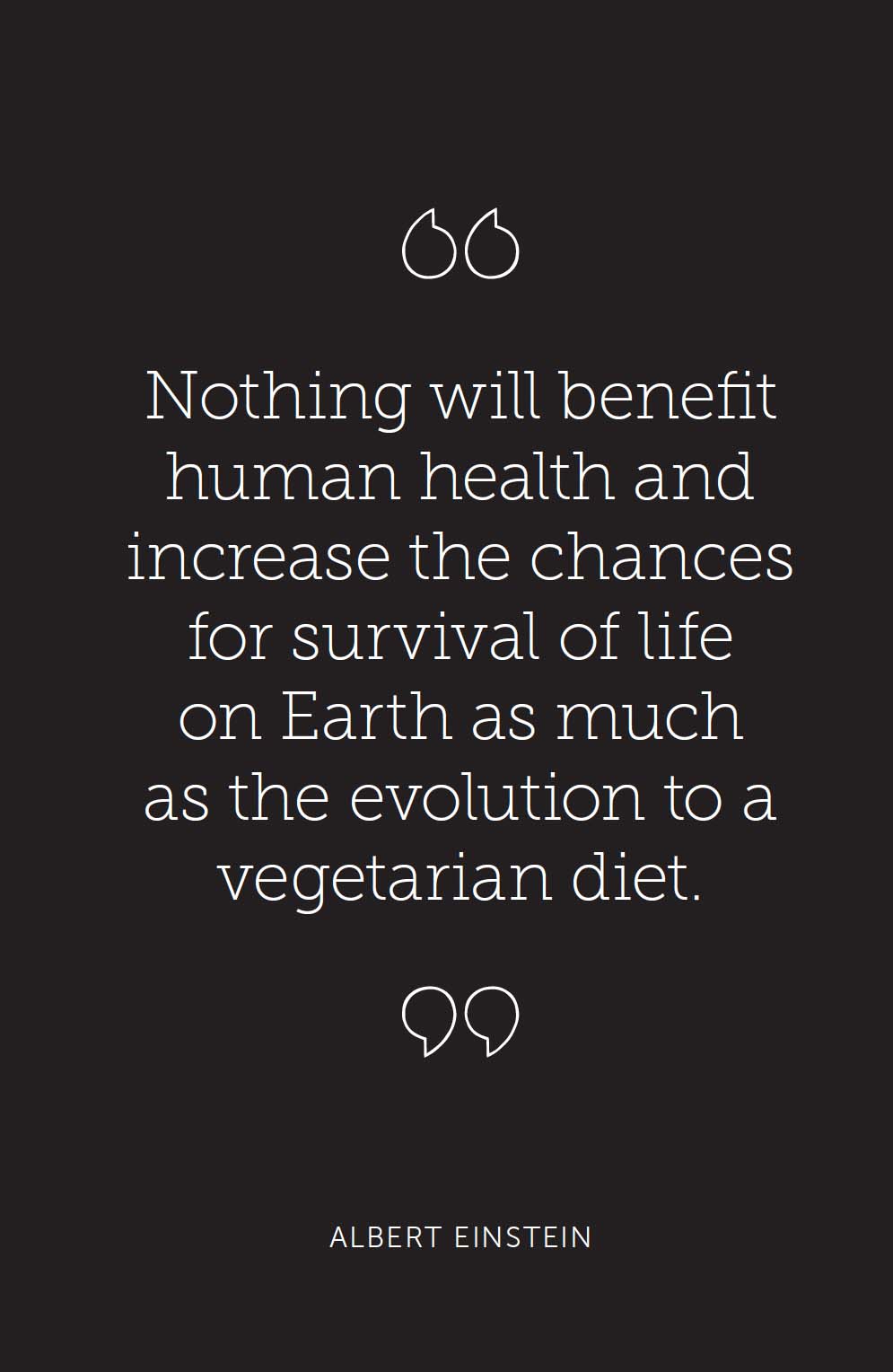
Ian especially really enjoys ‘veganising’ dishes, and cooking delicious vegan food has become our hobby, passion and our job. When we nail a brand new dish, and we mean really nail it, we get a dizzy sense of satisfaction. High-fives, fist-pumps and whoops are all commonplace in our kitchen. One of the dishes we’re most proud of is our Crispy Chilli Tofu, which mimics one of Henry’s old pre-vegan favourites, Crispy Chilli Beef, perfectly.
Contrary to what the media would have us believe, choosing to become vegan is a powerful and motivating change, and it is actually really easy to do. The power to save the planet is literally in your hands.
Taking shorter showers or using your bathwater to flush the toilet will all have a great impact. Replacing your toothbrush with a wooden one and cycling everywhere will help in so many ways, too. But avoiding meat and dairy is the single biggest way to reduce your impact on the Earth. A plant-based diet – or a more plant-based diet – is better for the planet and will drastically reduce your annual carbon footprint.
Even the least sustainable plant-based food is more sustainable than the most sustainable animal products.[39] That’s something we like to remind ourselves if we ever worry about using ingredients that have questionable sustainability or have travelled far.
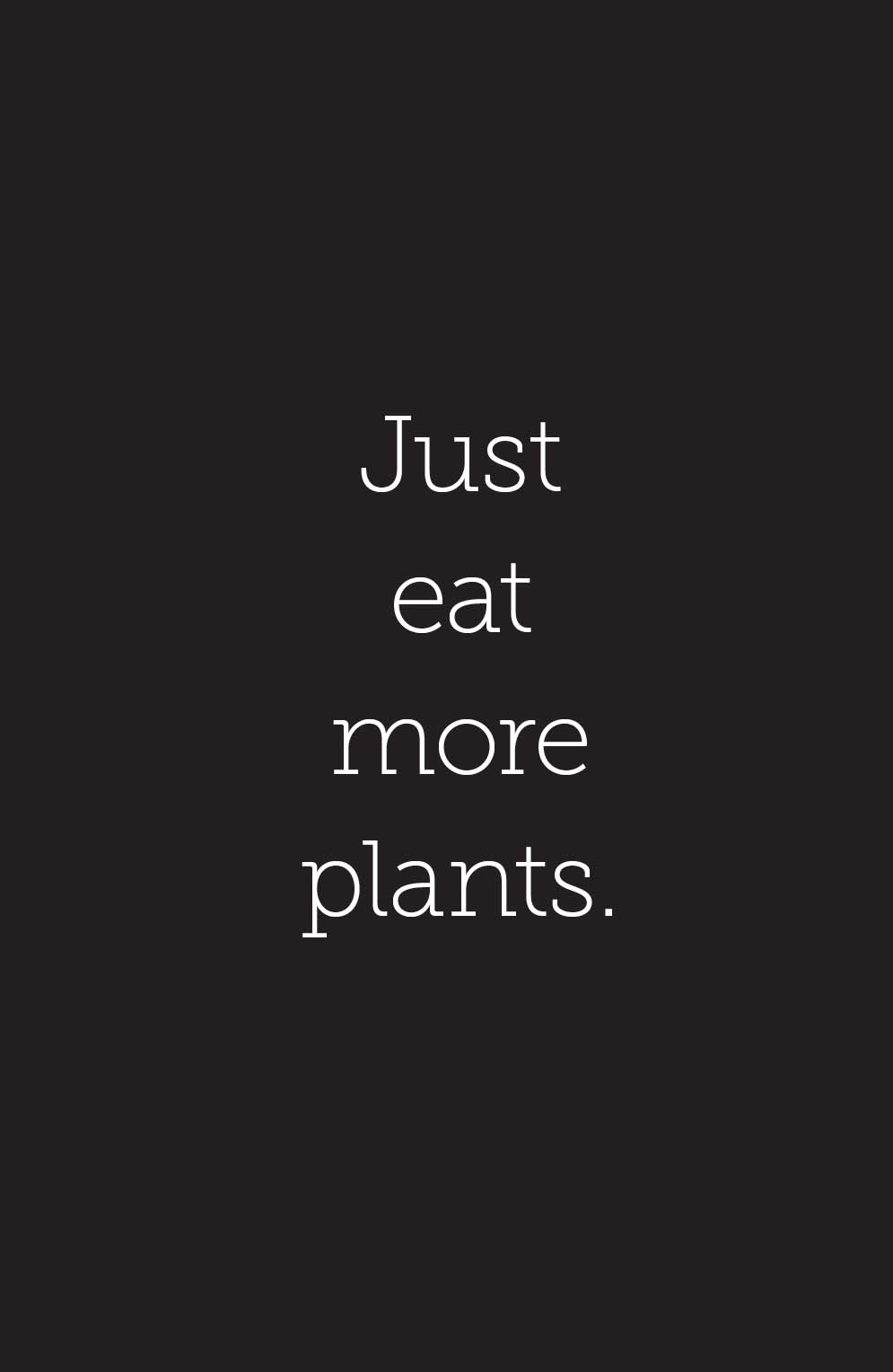

A global switch to more veggie-focused diets could reduce greenhouse gas emissions by two thirds and save 8 million lives by 2050.[40]
Red meat is responsible for 10 to 40 times as many greenhouse gas emissions as veggies and grains. [41] Beef creates up to 105kg of greenhouse gases per 100g of meat, compared to tofu which produces less than 3.5kg.[42]
Put simply, cows create a lot of methane – basically they fart and burp a lot. Feeding cows grass is a very powerful way to create greenhouse gases. And dairy is not off the hook either. It takes about 1,000 litres of water to make 1 litre of dairy milk, compared to 297 litres for the same amount of soy milk.[43] The least sustainable plant-based milk is significantly more sustainable, from the perspective of emissions, land use and carbon footprint, than the most sustainable dairy milk.[44]
It’s also worth noting that by supporting dairy production, you are still supporting meat production.
They are part of the same manufacturing process, subject to the same questionable welfare issues, and retired dairy cows are often used for meat. It’s not much of a life …
People love dairy though. Cold milk on cereal, melted cheese on toast, clotted cream on scones, milk chocolate, whey protein, lattes … the list goes on and on. For a lot of people, dairy’s a difficult thing to kick because it’s everywhere. A couple of hours spent reading blog posts and watching videos that highlight the problems that surround the dairy industry in terms of ethics, health and the environment should show you that dairy isn’t all that cool.
Dairy alternatives have really improved over the past couple of years and, as they get more popular, which they will, the products available are only going to get even better, making the transition away from dairy much easier. See here for more on the plant-based alternatives that we enjoy regularly.
SO HOW EXACTLY DOES EATING VEGAN HELP?
All the energy we ingest through food has, originally, come from plants. This is the energy cycle we learned about in school. We are able to harvest and eat those plants to get all the energy, nutrients, minerals and vitamins we need from them (more on this later).
When we rear animals for eating, we take this efficient form of plant energy and use it to sustain animals, like cows and sheep, so we can eat them later. This is much less efficient! Also, since animals are living creatures, most of their food is actually used for energy for their own day-to-day activity. Only a tiny fraction of the nutrients and energy in the food they eat ends up in the meat we buy. Cows convert only 4% of the proteins and 3% of the calories of the plants we feed them into beef[45] – 97% of the calories they consume is completely lost to us. To produce 1kg of beef requires over 13,000 litres of water, a water footprint six times larger than for pulses.[46] Meat accounts for 22% of all water use.[47]
According to researcher Joseph Poore, from Oxford University, about 55% of the world’s land is farmed, and 80–85% of this is used to raise animals.[48] If as much of the land currently set aside for grazing animals regrows as trees, it will help remove carbon from the atmosphere – it is estimated there could be a reduction in greenhouse gases by as much as 30–50%. In addition, more than a billion extra tons of food crops could go to humans if we stopped feeding them to animals. [49]
So not only is a plant-based diet better for the planet in terms of the processes involved in rearing animals, but it can free up land for animals to live naturally again, and trees can grow in those spaces, which can then start to reduce the amount of carbon in the atmosphere. This is still the best approach for getting carbon out of the atmosphere – known as rewilding. It involves restoring natural forests, mangroves, salt marshes and seagrass beds. These natural habitats are the best way researchers have identified of removing carbon dioxide from the atmosphere. And it would solve both climate breakdown and the extinction of species at the same time.[50]
Of course, we’re not suggesting it’s as simple as everyone, worldwide, stopping eating meat and redistributing the grain set aside to feed animals to hungry people while we all start planting trees. At the global level we need to consider the complexities of politics, the mechanisms of food distribution and the realities of farmers’ livelihoods. And at the local level we need to consider things like soil health, crop cycling and animal habitats.
We’re not claiming there’s some kind of magic solution, but the answer lies in this direction. These facts go to show how inefficient our current main choice of protein is, and why it’s literally chewing up the Earth’s resources.
WHAT ABOUT THE FARMER?
A note from Ian
I grew up in a reasonably big city. I love cities. I like their vibrancy, the people, the history, the architecture and the energy. Having said this, I also love the countryside. I was lucky enough to spend a good chunk of my childhood in a small (and I mean very small) village called Gunthorpe.
My grandparents, Charlie and Winnie, owned and ran a small arable farm there. I have many fond memories of that farm. The memories mostly revolve around my grandma’s wonderful cooking, but also exploring the old farm buildings and riding around in my grandad’s tractor as he ploughed fields, planted seeds and harvested crops.
I look back now, and realise that my grandfather worked bloody hard. All farmers do. When I say ‘worked bloody hard’ I don’t mean, ‘I got to the office at 9am, hammered out some emails then had lunch, had a meeting, smashed out a couple of spreadsheets and was home for 6.30pm.’ I mean, ‘I woke up at 4.30am, headed to one of my huge fields, smashed out some back-breaking labour until it got too dark to carry on, got home for 10pm, went to bed and hit repeat the next day. Every day.’
I understand how hard farmers work and I’ve got nothing but the utmost respect for their tremendous work ethic. However, having said that, I wholeheartedly believe that some of the practices used in farming need to be re-evaluated and reformed. As the UK edges ever closer towards a more vegan way of life, and demand for vegan products grows and demand for non-vegan products declines, it’s absolutely essential we give our farmers the tools, education and incentives they need to adapt and thrive. We need to work with farmers to harness their unquestionable and inspiring work ethic and experience, and include them as a big, important part of the inevitable switch to plant-based living.

We’ve been talking a lot about meat, but we shouldn’t ignore our sea-dwelling friends either.
Half of all marine life has been lost in the last 40 years[51] and 87% of fish populations are fully or over-exploited.[52]
We’ve already killed 90% of big ocean predatory fish,[53]and it’s been predicted that our world will run out of saltwater fish by 2048.[54]
Increasing sea temperatures have destroyed coral reefs and all coral reefs are projected to be lost by 2050.[55]
Fishing is also a grossly inefficient way of eating; for every 1lb of fish caught, up to 5lb of unintended marine species are caught and discarded as by-kill.[56]
FEEDING A GROWING POPULATION
There’s another thing to consider when thinking about the sustainability of our current diets. Our nutritional needs are going to evolve over the next few decades with the human population expected to reach more than 9 billion by 2050 – a third higher than it is today.[57]
So what’s the answer? Meat? No. Increasing annual meat production is a bad idea, however we do it. All approaches will use more land, create more deforestation, more climate change, more loss of biodiversity.[58] Feeding grain to livestock increases demand for grain and drives up prices, making it harder for the world’s poor to feed themselves. If all grain were fed to humans, we could feed an extra 3.5 billion people.[59]


